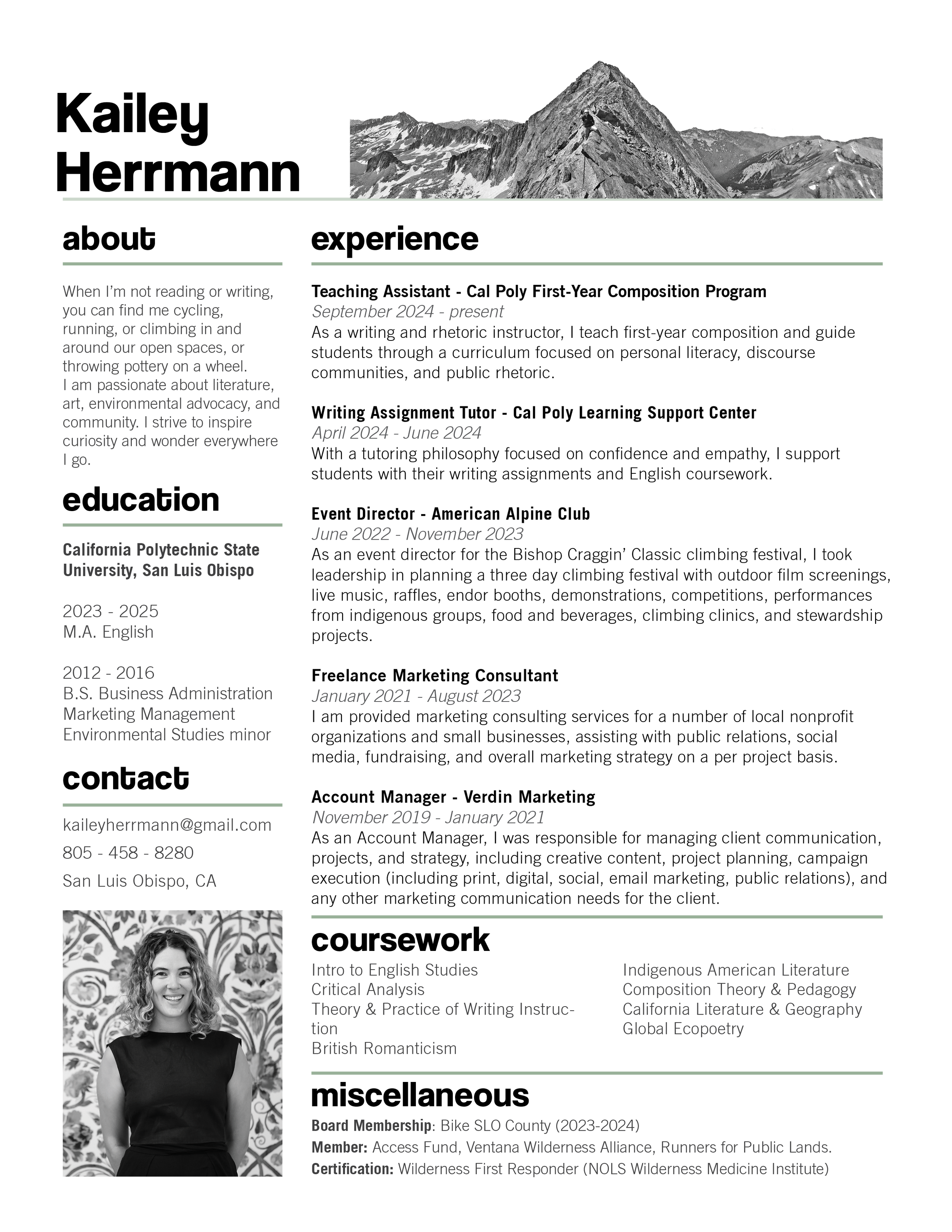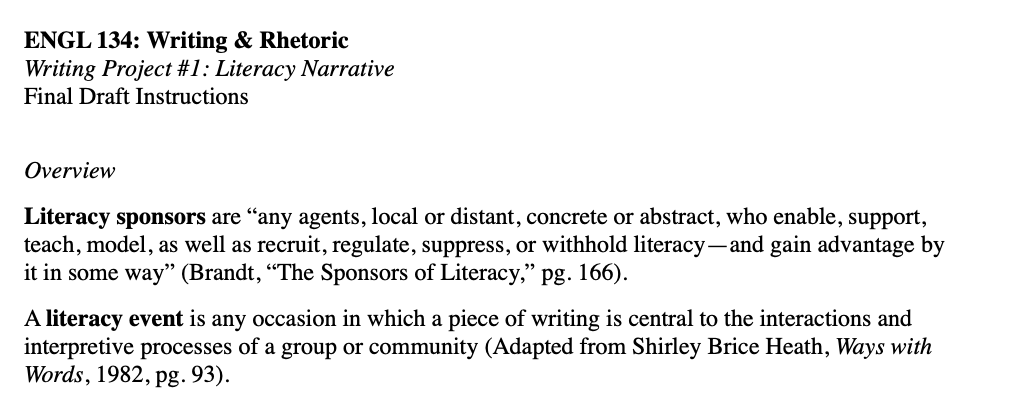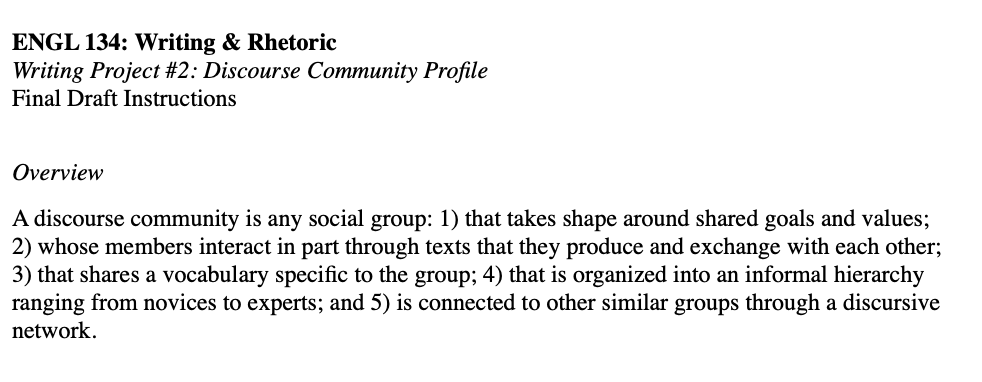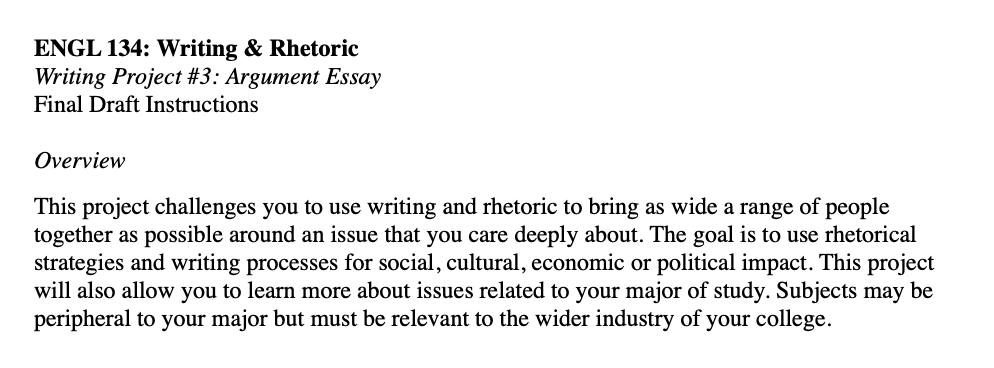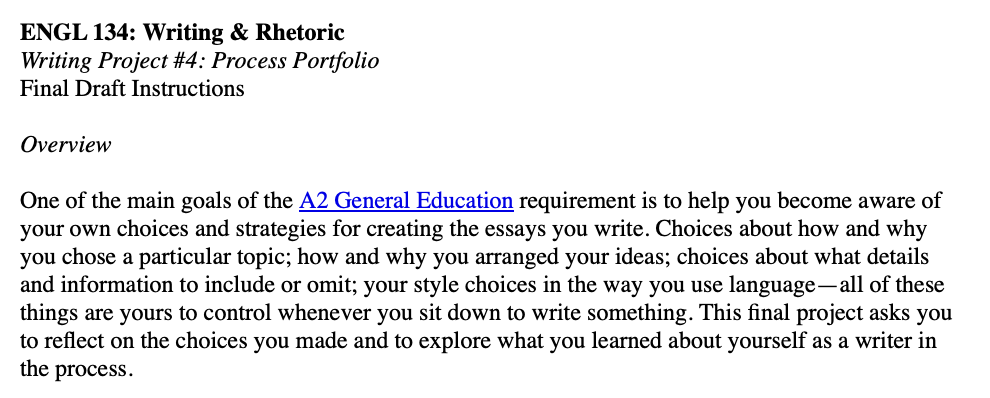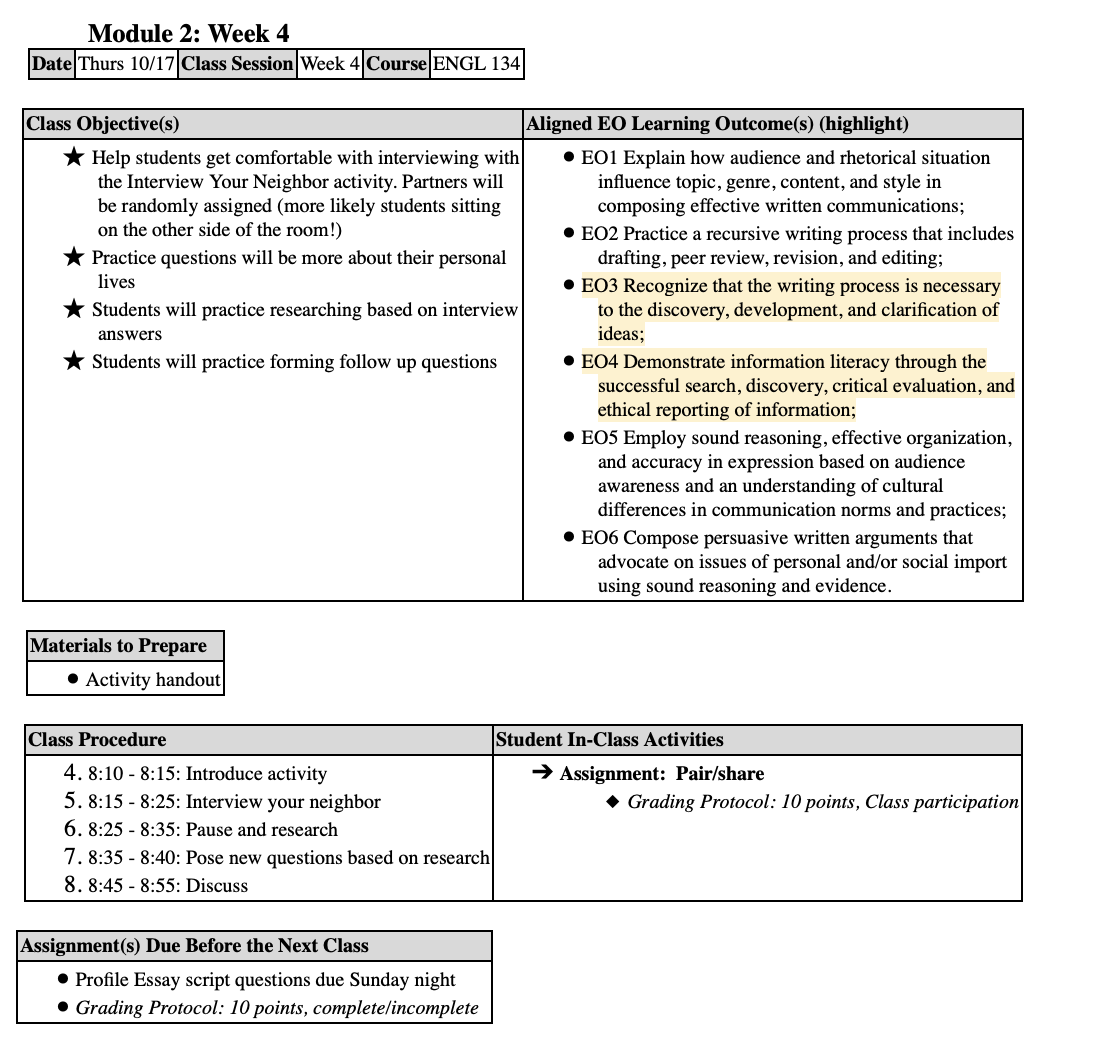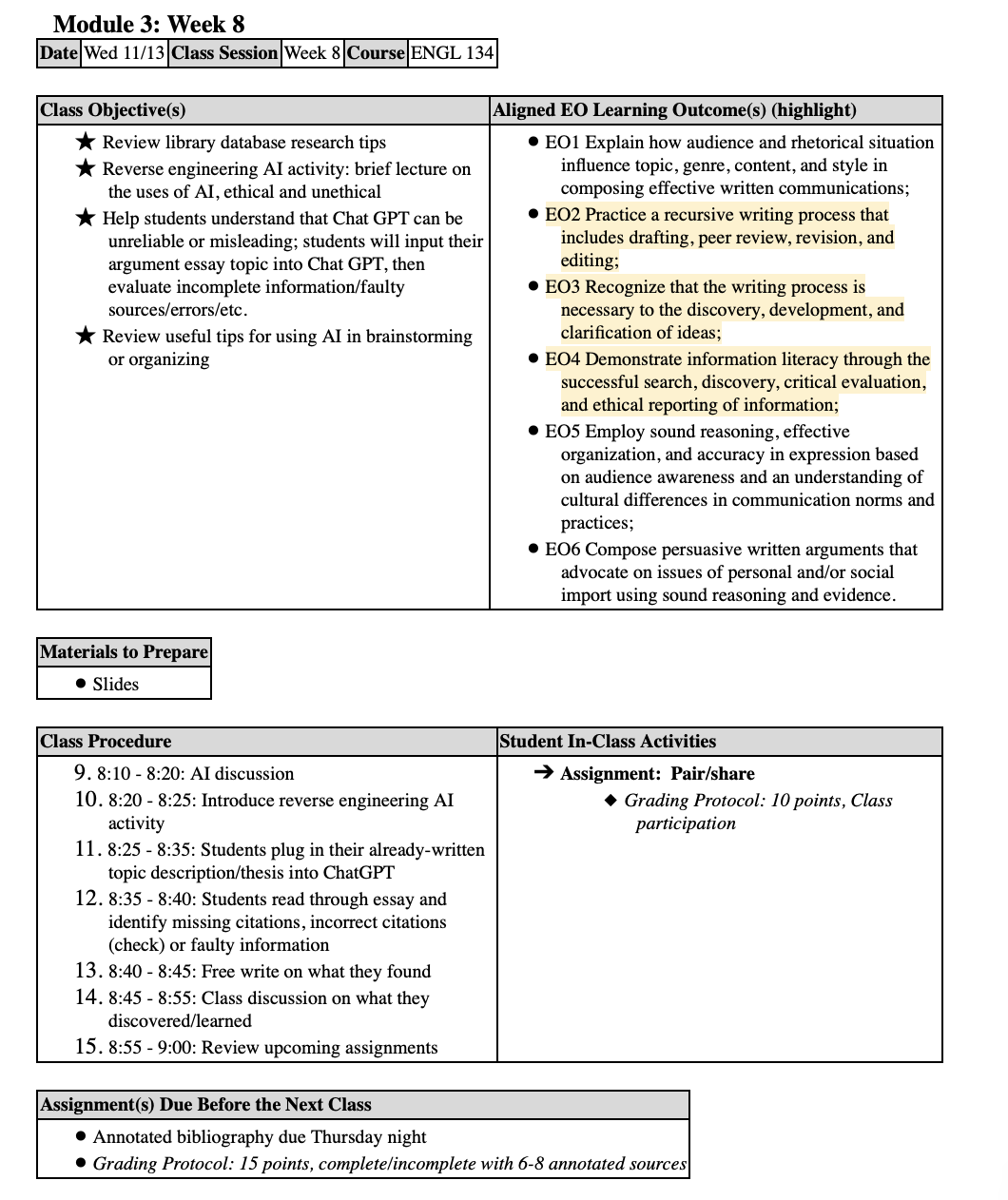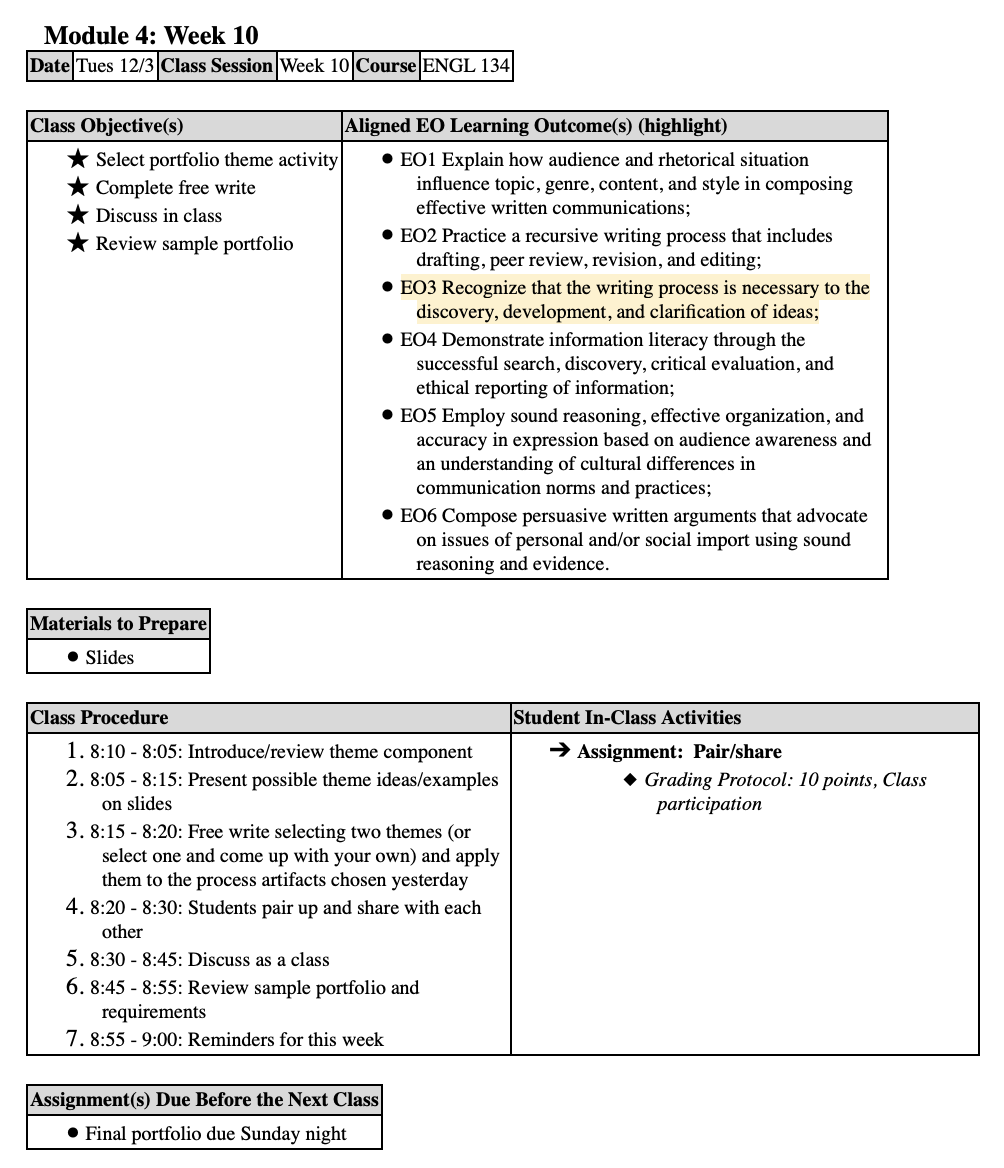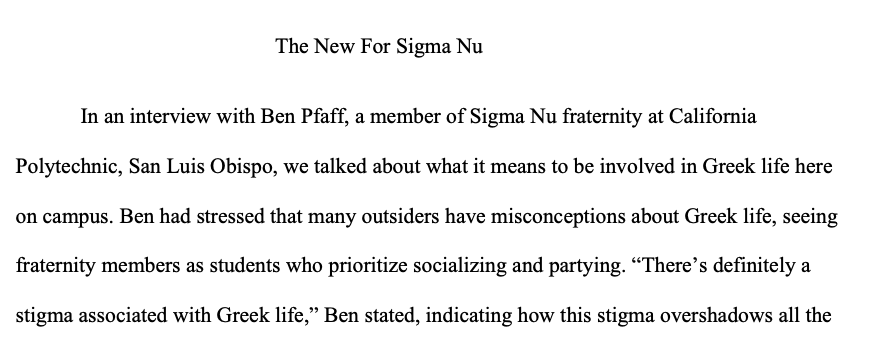
ENGLISH 506
Pedagogical composition
final portfolio
by Kailey Herrmann
Table of Contents
-
Join me on this journey of first-year composition!
-
A one page statement describing my teaching values, philosophy, and guiding pedagogy.
-
A one page resume outlining my previous work experiences, skills, certifications, and volunteering.
-
Items include course syllabus, writing assignment instructions (modules 1-4), lesson plan samples (modules 1-4), and in-class activities (modules 1-3).
-
Includes final draft writing samples from modules 1-3 in a range of grades, with some marginal comments and end comments included.
-
My most recent conference proposal discussing nostalgia and teaching.
One spring day in 2020, in the midst of a country-wide pandemic lockdown, I sat at a bar stool with my work laptop set upon a washing machine. My makeshift desk. I gazed out into the backyard of my one-bedroom, shotgun-style apartment built in 1895, admiring the textures of the knobby pepper tree. As the leaves waved back at me in the breeze, I thought, “I really don’t want to do this job anymore.”
My title sounded cool enough - Account Manager at a marketing firm - but the work wore into me over time, like a river carves out a canyon in the mountains. I reflected deeper into myself in a primal way - what did I enjoy as a child? Reading and writing. Those seedling thoughts launched my graduate school application to the English masters program at my alma mater. So here we are.
This portfolio encompasses the trek to find a new path for myself through teaching first-year composition. By gathering materials I’ve adapted and created, it provides a snapshot of my experience, progress, and confidence in teaching. Welcome.
-Kailey Herrmann

Teaching Philosophy
In a first-year writing course, I hope to bring to my students the opportunities to reflect, learn, and become who they wish to be. It seems like only yesterday, I was sitting in the same chairs as my students, having walked from my red brick dorm to my first-year courses across campus. I remember what a tumultuous time it was, trying to figure out how to balance an entirely new life, while meeting new people, absorbing new information, and eating new food, all on my own. The most empowering part was knowing I could become the person I wanted to be and develop my identity and my voice. Taking a moment to reflect on my experiences grounded me among the chaos.
The core of my teaching philosophy centers on reflection, personal experiences, and identity formation. I recognize the immense shifts first-year college students experience as they are thrust into the wider world of college and living on their own, likely for the first time. Reflecting on their own choices is also new to them - for the most part, they’ve robotically adhered to strict schedules and even stricter guidelines for the standard five paragraph essay, with an introduction, thesis, and conclusion. I believe students’ personal experiences are valuable in contributing to the decisions they make in their own writing, as they develop their personal voices and styles. During this critical period of new social and academic landscapes, their identities are forming as they are reacting to new experiences and forming opinions on what affects them. An important aspect of my teaching philosophy is to place value on those experiences and their expression of them. How they infuse their new and changing identity into their writing matters and developing a personal voice is just as important as forming an argument or telling a story. Providing space for students to talk about themselves in a variety of contexts can also be a new environment to expand possibilities in academic writing. This expressivist-based strategy is more closely applied in assignments centered on reflective writing, narrative essays, and personal responses. This approach affirms individuality, fosters development, and encourages critical thinking as a complement to improving skills in writing. While expressivist pedagogy is not the only tenet in my teaching philosophy, it does guide many of the socio-epistemic assignments in this class. Other theories of rhetoric are routinely applied, such as cognitive processes during workshops and discussions, but the expressivist theme is evident throughout. Ultimately, my goal is to inspire students to harness their personal experiences and perspectives as they develop their voices, promoting the idea that personal writing is valuable, meaningful, and impactful.

Curriculum Vitae

ENGL 134: Writing & Rhetoric
Teaching first-year writing and composition provides a unique opportunity to instill confidence and encourage personal voice for college freshman. As they enter an entirely new environment, they are given new tools to develop their own writing styles and processes. My course materials focus on peer to peer interaction, reflective writing, and consistent questioning to encourage students to think widely and deeply about the choices they make.
Course Syllabus
Welcome, Mustangs!
English 134: Writing and Rhetoric, Winter 2025
Instructor: Kailey Herrmann (she/her/hers)
Email: kherrm01@calpoly.edu
Class meeting times: Monday, Tuesday, Wednesday, Thursday 11:10 AM - 12:00 PM
Class location: 22-218 (English 22)
Office hours: Tuesdays, 12:00 - 2:00 PM
Virtual appointments can be made by appointment. Send me an email with a few time slots available and we will try to coordinate.
Office location: Building 20, office 133K
Course Description
ENGL 134 is an introduction to college writing. You’ll study the rhetorical principles and strategies needed for producing effective writing. You’ll learn to use writing as a recursive process that leads to more complex and nuanced thinking, greater coherency, stylistic complexity, and rhetorical awareness. The course fulfills GE Area A2 with a grade of C- or better (70%).
Educational Outcomes
This course satisfies the Area A2 requirement of the General Education (GE) program.
• EO1 Explain how audience and rhetorical situation influence topic, genre, content, and style in composing effective written communication
• EO2 Practice a recursive writing process that includes drafting, peer review, revision, and editing
• EO3 Recognize that the writing process is necessary to the discovery, development, and clarification of ideas
• EO4 Demonstrate information literacy through the successful search, discovery, critical evaluation, and ethical reporting of information
• EO5 Employ sound reasoning, effective organization, and accuracy in expression based on audience awareness and an understanding of cultural differences in communication norms and practices
• EO6 Compose persuasive written arguments that advocate on issues of personal and/or social import using sound reasoning and evidence.
Required Course Materials
Peters, Jason, ed. Fresh Voices: Composition at Cal Poly, vol. XVII (2024-25). Hayden McNeil, 2024. You are expected to bring a hard copy to class with you each day.
Fresh Voices is an annual collection of essays written by Cal Poly students in last year's ENGL 133, 134, and 145 classes. You'll see how first-year students have imagined and responded to the same kinds of writing situations you'll be facing in this class: writing stories about past experiences, writing about communities, and writing about urgent public issues that impact you. Best of all, you could possibly publish an essay in next year's edition. When you sit down to read one of the essays in this book, think about how the writer managed to engage, inspire, teach, inform, and move you. To do that, they had to imagine you as a reader without ever knowing who you are. Whenever you sit down to write, imagine that you're potentially doing the same thing: writing for potentially thousands of other first-year Cal Poly students next year whom you have yet to meet, and who might only encounter you through your words.
Assignments
1. Three writing projects: a literacy narrative, a community profile, and an evidence-based argument.
2. Final portfolio: during Finals Week, submit a portfolio that discusses and reflects on your writing process and learning progress in the course.
3. Class participation: miss no more than two class meetings unexcused, respond to and engage with your classmates in a collegial and constructive manner, participate in in-class activities such as free writes, and meet all assignment deadlines.
Grading
Literacy Narrative - 20%
Profile - 20%
Argument - 20%
Final Portfolio - 30%
Class Participation - 10%
Late Work
Late work will not be accepted unless you have made prior arrangements with me for an extended deadline. This policy does not apply to students with a DRC accommodation for extended due dates. For writing assignments, each day the paper is late, you will lose 5% of your grade.
Extra Credit Opportunities
The opportunity to earn extra credit is by visiting the Writing & Learning Support Center to schedule a 30 minute tutoring session with a writing tutor. Additional opportunities may be available throughout the quarter, and they will be announced on Canvas.
Academic Integrity & Use of AI
If you pass off someone else’s work as your own (plagiarize), you’ll fail the course and I’ll report you to the Office of Student Rights and Responsibilities. Inadvertent plagiarism due to unfamiliarity with academic citation conventions will be addressed with individual students on a case-by-case basis. The use of generative AI tools is prohibited without prior permission from me. If you would like to use AI writing tools for any assignments (from idea generation to text creation to text editing), you must first ask me for permission, explain how you plan to use the tool, and properly cite your use. All writing produced in any part by AI must be properly cited. Use of AI without instructor permission or without adequate citation is a violation of academic ethics and will be treated as plagiarism.
Course Accessibility
I understand the many challenges you might sometimes face. University policy provides reasonable accommodations to students who need different learning approaches or environments to participate in class activities or to meet course requirements to the best of their abilities. If you have a disability for which you’d like to request an accommodation, please contact the Disability Resource Center, Building 124, Room 119, at (805) 756-1395, as early as possible in the term, and communicate with me about your needs. You do not need to disclose a disability to me to receive accommodations.
A Note for Undocumented Students
I strive to make my courses accessible to all students regardless of documentation status. If your status presents obstacles to engaging in specific activities or fulfilling specific criteria, you may request confidential accommodations. You dot no need to disclose to me your documentation status in order to request or receive accommodations. You may consult with the Dream Center (https://dreamcenter.calpoly.edu/) for examples of possible accommodations and how to request them from me. Such arrangements will not jeopardize your student status, your financial aid, or any other part of your residence.
Classroom Climate
I strive to make this class a place where you will be treated with respect, and I welcome individuals of all ages, backgrounds, beliefs, races, ethnicities, social classes, genders, gender identities, gender expressions, national origins, documentation statuses, religious affiliations, sexual orientations, abilities – and other visible and nonvisible differences. All members of this class are expected to contribute to a respectful and inclusive environment for every other member of the class. This does not mean we cannot disagree or have different ideas. It does mean we try to consider perspectives other than our own, though they may differ from our own beliefs/experiences.
Electronics in Class
Laptops will be encouraged in class for writing assignments and relevant activities, but you will be asked to close your laptop during some lectures, presentations, and other activities that do not require writing or internet access. Please put phones away and turn on Do Not Disturb/Focus during class to minimize distractions to yourself and your peers. Apple Watches are okay as long as they are not distracting you with notifications.
Attendance
Students are expected to attend class regularly to keep the quality and quantity of their work high. The quarter system is a fast-paced environment and missing class can negatively impact your progress in the course. Excused absences, which require notice via email, include illness or injury, any extenuating circumstances of close relatives, active participation in university events (an instructor may require a statement from the adviser involved certifying that the student was actively participating in a recognized university event), religious holidays, selective service and military reasons, NCAA athletic competitions, jury duty, or job or internship interviews. If an event does not fall under these categories, you may still request an excused absence by speaking with me directly. If you have more than two (2) unexcused absences, your participation grade will be greatly affected.
Illness
Arriving in a new environment, living in the dorms, and being surrounded by many new people often leads to getting sick more often than you have in the past. Please do not come to class if you are sick. Send me an email and we will connect on how you can make up for missed class time and work. If you are recovering from illness and feel good enough to come to class but still have some symptoms, please wear a mask.
Preferred Pronouns
My preferred pronouns are she/her/hers. Please let me know your preferred pronouns and if you’d like me to address you by an alternate name than what might be on my roster.
Campus Resources
• Basic Needs Resources: Our campus has several free resources to support students in these situations, including campus meals, campus food pantry, food distributions, emergency housing, and help applying for the CalFresh program, which provides up to $202/month for groceries for a one-person household. If one of these resources may help you or a friend, please see a detailed list of on-campus resources at calpoly.edu.
• Campus Counseling Services: Cal Poly Counseling Services promotes the development of holistic student emotional health. As mental health professionals, we serve the campus community through advocacy and the provision of confidential, accessible services. Ph: 805-756-1211 Location: 27-135 Website: http://hcs.calpoly.edu/counseling
• SAFER: Cal Poly’s confidential advocacy, education and support resource for addressing sexual assault, sexual misconduct, dating violence, domestic violence, and stalking. Ph: 756-2282; email: safer@calpoly.edu Website: https://safer.calpoly.edu/ *As an employee of our university I am a mandated reporter for sexual assaults – confidential reporting is available at SAFER and the Counseling Center.
• Undocumented Students Working Group: The Undocumented Student Working Group at Cal Poly San Luis Obispo comprises faculty, staff, and administrators dedicated to supporting the personal and professional development of undocumented students and creating institutional change. Ph: 756-2418; email: undocu@calpoly.edu Website: http://undocually.calpoly.edu.
• Student Diversity & Belonging houses multiple centers related to 1) gender & sexuality and 2) race & ethnicity. that might be of use to you. You can find more information at https://culture.calpoly.edu/
• Office of Writing and Learning: provides tutoring and related services intended to ensure optimal educational opportunities for diverse student populations through peer-to-peer support in reading comprehension, writing, test preparation, and various subjects in addition to academic support workshops. Find more information and make a tutoring appointment at: https://writingandlearning.calpoly.edu
Calendar Overview (subject to change)
Module 1: Writing Across Languages
Week 1: Literacy sponsors and events
Week 2: Rhetorical devices and appeals
Week 3: Literacy narrative, multilingualism
Module 2: Writing about Communities
Week 4: Discourse communities, ethnography
Week 5: Profiling, artifact analysis, interviewing
Week 6: Final profile essay
Module 3: Public Writing
Week 7: Public rhetoric, library research
Week 8: Annotated bibliography
Week 9: Argument essay
Module 4: Final Reflections
Week 10: Final portfolio
Finals Week

Course materials
Module 1 Essay:
Literacy Narrative
Module 2 Essay:
Discourse Community Profile
Module 3 Essay:
Argument
Module 4:
Final Portfolio
Module 1 Lesson Plan Sample
Module 2 Lesson Plan Sample
Module 3 Lesson Plan Sample
Module 4 Lesson Plan Sample
Module 1 Activity:
Mother Tongue
Module 2 Activity:
Interview Your Neighbor
Module 3 Activity:
Logical Fallacies

Evaluated Student Work
The following evaluated student work includes writing project final draft samples and end comments. Some of the submissions do not have margin comments - this is something I was getting accustomed to as I graded. In an effort to avoid too much nitpicking, I often read through the entire essay and combined all of my thoughts in a few paragraphs at the end, rather than pointing out specific edits. I did this especially in the beginning, when I wanted to be deliberate and cautious with grading student work and provide a more holistic evaluation.
Literacy Narrative: 90%
Literacy Narrative: 92%
Literacy Narrative: 96%
Profile Essay: 90%
Profile Essay: 85%
Profile Essay: 70%
Argument Essay: 95%
Argument Essay: 85%
Argument Essay: 70%

Professional Development
The following proposal was submitted to:
(Be)longing; nostalgia and the construction of ideology (ACLA Annual Meeting 2025) hosted by the American Comparative Literature Association
Topic: Nostalgia in the College Writing Classroom: Acceptance and Rejection of Pre and Post Internet Era Technology
In this presentation, an English M.A. graduate student and teaching assistant in Writing & Rhetoric will explore the impacts of technology use, both physical and digital, on the college classroom environment in contrast with pre-internet era activities. The presenter will discuss the nostalgic classroom environment of pencil- and paper-based engagement, how internet-based and digital technology have changed classroom environments, and where writing instructors are adapting in response to artificial intelligence in composition classrooms. With the rise of laptop computer use, physical writing has lessened significantly, but with the increase in AI and the challenges instructors are facing to combat unethical use, many writing teachers are turning back to handwritten assignments. The presentation will assess this reversion with the framework of nostalgia and the difference in digital and non-digital literacy between pre-millennial instructors and post-millennial students.


